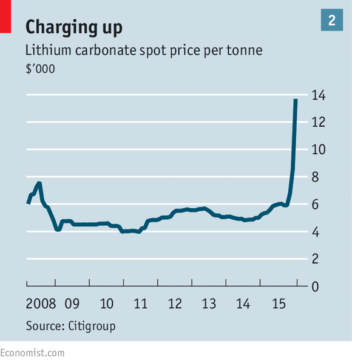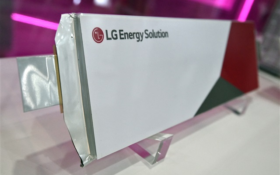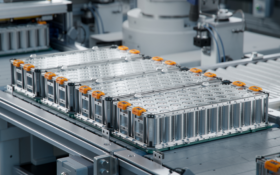The rocketing price of lithium in China could cause a 5-8% drop in profits for lithium battery makers, says a director at one of China’s largest battery firms.
Chief Scientist Dai Guiping, from Chaowei Power, said that along with the rising price of lithium, other components such as separators had also gone up.
“However,” he stressed, “the price of lithium-ion batteries themselves has not gone up, and will not go up for the next two to three years.”
Dai said he did not believe the lower profits would result in many firms going out of business, and if predictions by London-based market analyst CRU Group (Commodities Research Unit) come true, the price of the material will not be high for the long term anyway.
CRU said the price of lithium had almost trebled in a year, from $7,000 a tonne in mid-2015 to the current $20,000.
But if the future trend followed any of three possible scenarios, this would drop in the long term.
“Our analysis shows… why a positive demand trigger and a sharp price spike can often be followed by large over capacity overhangs and a prolonged period of low prices.”
The CRU report described three possible future scenarios, from ‘muted’, where a lower-than-expected uptake of EVs would mean market balance was restored; to ‘measured’, where projects would be steadily developed to meet short-term demand until reaching capacity post 2020, when prices would revert; to ‘aggressive’, where producers would race to supply the market as quickly as possible, and end up with over supply, bringing prices down.
In a nutshell, the long-term price is likely to fall no matter what happens in the short term.
BEST reported in April on how another Chinese battery giant, BYD, had announced plans to secure its own access to lithium supplies because of the spiralling cost, although the company did not give details.
And it appears that the Chinese government is keen to secure other essential materials for battery makers, with the purchase by China Molybdenum of the Tenke mine in the Democratic Republic of Congo.
“The purchase of the Tenke mine, which contains one of the world’s largest known deposits of copper and cobalt, shows how Chinese companies are now moving to take a dominant position in battery materials as the country prepares to shift its economy from heavily polluting industries,” says a report in the Financial Times.












